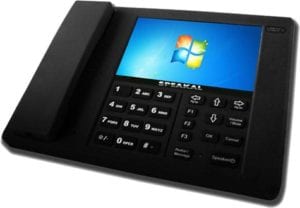Right now we’re starting to see a lot of convergence between mobile devices and desktop telephony equipment. Modern VoIP handsets are starting to stock up on functionality and applications that has, so far, been the sole domain of smartphones. This is true for touchscreens and app-compatible operating systems.
Convergence in Unified Communications
When you take the smartphone dynamics to desktop phones, you will notice an interesting trend.
 Microsoft’s next Windows operating system is going to interact seamlessly with Microsoft’s next generation of mobile OS. In fact, Windows 8’s mobile and desktop/laptop operating systems are doing more than merely “converging”. They will operate closer than just “seamlessly”. Windows for your computer is becoming the exact same OS as Windows for your next smartphone.
Microsoft’s next Windows operating system is going to interact seamlessly with Microsoft’s next generation of mobile OS. In fact, Windows 8’s mobile and desktop/laptop operating systems are doing more than merely “converging”. They will operate closer than just “seamlessly”. Windows for your computer is becoming the exact same OS as Windows for your next smartphone.
Provided, of course, you use a Windows phone for Unified Communications, which very, very, very few people do. But the relatively low popularity of Windows mobile devices needs to be taken alongside the continued popularity of Microsoft operating systems. Especially among the government and enterprise sets of users. Will the next generation of VoIP handsets run Windows 8?
Even if Microsoft went bankrupt next year the company’s decision to utilize the same operating system among desktop and mobile devices is highly telling about their vision of the future of communications technology. They envision the movement towards mobile competition including Apple and Google (owner of the popular Android mobile platform). Over the last year Apple has been steadily aligning their mobile and desktop operating systems by streamlining their desktop environment. Recently they began to establish uniform naming practices across for applications across their devices. Google, meanwhile, has been getting their feet wet in the world of desktop computers, ostensibly in response to the wild success of the company’s mobile efforts. There are presently several SIP handsets that run on Google’s Android.